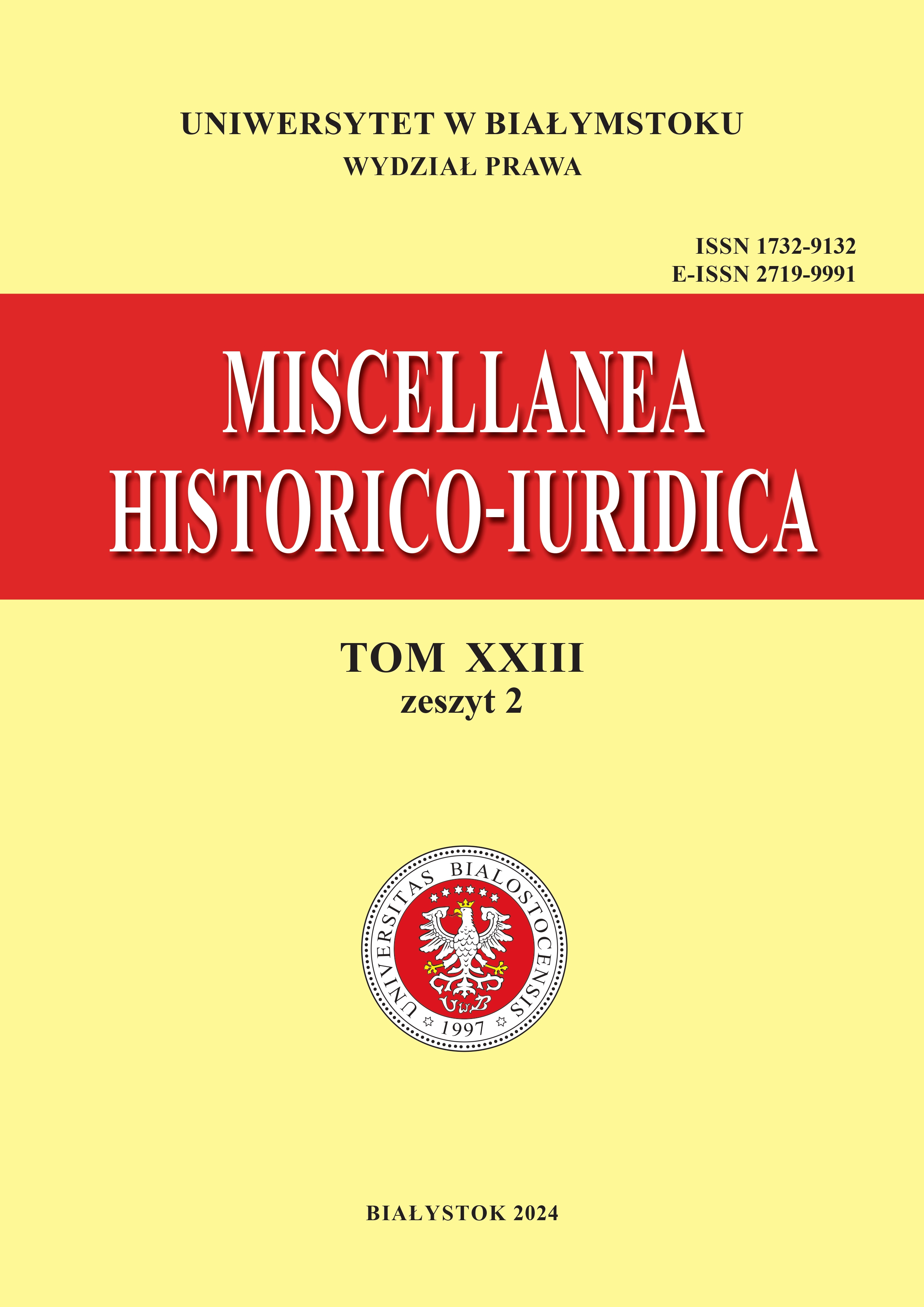Criminal Nazi Medical Experiments and the Public International Law
Keywords:
Nazi medical experiments, World War II, Nuremberg trial, international lawAbstract
The Nazi medical experiments were carried out during World War II – the years 1939 to 1945 and they were connected with establishing and administering concentration and extermination camps throughout the occupied Europe. Nazi medical experiments left their mark on people of various nationalities; however, their victims were primarily Jewish, Polish and Romani. Criminal experiments were also practiced on disabled people, homosexuals, Jehovah’s Witnesses and political prisoners and prisoners of the war. Criminal medical experiments were performed mainly in the German concentration camps, i.e. in Auschwitz-Birkenau, Dachau, Ravensbruck, Sachsenhausen, Kulmhof and Majdanek, which helped to hide them from the international community. The response to Nazi criminal medical experiments was the “trial of doctors” that took place from 1946 to 1947 at the US Military Tribunal No. 1 in Nuremberg.
The purpose of this article was to analyze and examine what impact Nazi medical experiments had on the shape of the international law. To achieve the purpose of this article, it was reasonable to use several research methods. To the fullest extent, the formal-dogmatic method was used, in which the international legal acts regulating the principles of medical experiments on human beings, especially those enacted after World War II, were analyzed. The indicated method was supplemented by a study of the literature on the subject and the views of the doctrine. The second method used in the article is a case study, consisting of an analysis of the course of the Nuremberg trials.
References
Bassiouni Cheriff, Baffes Thomas, Evrard John, Le contrôle international de l’expérimentation sur l’homme, ”Revue Internationale de Droit Pénal” 1980, nr 3–4.
Control Council, Law No. 10, Punishment of persons guilty of war crimes, crimes against peace and against humanity, https://crimeofaggression.info/documents/6/1945_Control_Council_Law_No10.pdf.
Cyprian Tadeusz, Sawicki Jerzy, Materiały norymberskie. Umowa – statut – akt oskarżenia – wyrok – radzieckie wotum, Wałbrzych 1945.
Górski Radosław, Zima Maria, Zbrodnicze eksperymenty medyczne dotyczące układu kostno-szkieletowego kończyn dolnych, wykonywane na Polkach – więźniarkach w KL Ravensbrück oraz ich następstwa dla stanu życia, zdrowia i późniejszego funkcjonowania operowanych, „Pamięć i Sprawiedliwość” 2021, nr 2 (38).
Hamankiewicz Maciej, Przyrzeczenie lekarskie jako Preambuła do Kodeksu Etyki Lekarskiej, „Medyczna Wokanda” 2016, nr 8.
Klafkowski Alfons, Obozy koncentracyjne hitlerowskie jako zagadnienie prawa międzynarodowego, Warszawa 1969.
Kodeks Etyki Lekarskiej, zwany „Zbiorem zasad deontologii lekarskiej”, Dziennik Urzędowy Izb Lekarskich w 1935 r., „Kodeks Lekarski”, https://nil.org.pl/dokumenty/kodeks-etyki-lekarskiej.
Kodeks Norymberski 1997 w 50. rocznicę ogłoszenia wyroku w norymberskim procesie lekarzy i Kodeksu Norymberskiego, https://p-ntzp.com/files/07Kodeks.pdf.
Konwencja genewska o ochronie osób cywilnych podczas wojny z dnia 12 sierpnia 1949 r. (Dz.U. 1956 nr 38, poz. 171).
Konwencja o ochronie praw człowieka i godności istoty ludzkiej w odniesieniu do zastosowań biologii i medycyny: Konwencja o prawach człowieka i biomedycynie z dnia 4 kwietnia 1997 r., https://www.poltransplant.org.pl/konwencja_o_prawach.html.
Krupiński Piotr, Wir sind doch keine Versuchskaninchen”. Eksperymenty pseudomedyczne we wspomnieniach więźniarek z Ravensbrück, „Konteksty Kultury” 2017, z. 4.
Krzyżewska Barbara, Kodeks Norymberski a autonomia jednostki, „Studia Ecologiae et Bioethicae” 2016, t. 14, nr 3.
Malinowska Joanna, Eksperymenty medyczne na terenie byłego obozu koncentracyjnego Dachau, [w:] Podróż do miejsca pamięci Dachau. Materiały naukowo-dydaktyczne, red. Kinga Anna Gajda, Aneta Pazik, Kraków 2014.
Międzynarodowy Pakt Praw Obywatelskich i Politycznych z dnia 19 grudnia 1966 r. (Dz.U. 1977 nr 38, poz. 167).
Muzeum Ziemi Tarnowskiej, https://muzeum.tarnow.pl/na-bister/oranienburgsachsenhausen-elementy-wystawy/.
Nation Treaty Series; World Medical Association, Declaration of Helsinki Ethical Principles for Medical Research Involving Human Subjects, “Journal of the American Medical Association” 2013, nr 20.
NMT Case 1, USA v. Karl Brandt et al.: The Doctors’ Trial, https://nuremberg.law.harvard.edu/nmt_1_intro.
Okoniewska Katarzyna, Zbrodnicza medycyna. Eksperymenty farmakologiczne i doświadczenia z użyciem środków chemicznych przeprowadzane na więźniach z Auschwitz, „Studia Historyczne” 2017, R. LX, z.1 (237).
Olejnik Stanisław, Eksperyment lekarski na człowieku w świetle oceny etycznej, „Collectanea Theologica” 1955, nr 26 (1).
Patuzzo Sara, Goracci Giada, Ciliberti Rosagemma, Thomas Percival. Discussing the foundation of Medical Ethics, “Acta Biomed” 2018, 89(3), s. 343–348, https://www.ncbi.nlm.nih.gov/pmc/articles/PMC6502118.
Reich Warren (red.), Encyklopedia Bioetyki, https://artnscience.us/Med_Ethics/reichsrundschreiben_1931.pdf.
Riddick Frank Jr, The code of medical ethics of the american medical association, “Ochsner journal” 2003, vol. 5, nr 2, s. 6–10, https://www.ama-assn.org/sites/ama-assn.org/files/corp/media-browser/public/ethics/1847code_0.pdf.
Skorut Jolanta, Refleksje na temat monografii Ernsta Klee Auschwitz. Medycyna III Rzeszy i jej ofiary, „Acta Universitatis Wratislaviensis” 2011, nr 3386.
Trials of War Criminals Before the Nuernberg Military Tribinals, The Medical Cale, t. 1.
Vollmann Jochen, Winau Rolf, Informed consent in human experimentation before the Nuremberg code, „BMJ” (Clinical research ed.) 1996, vol. 313, no. 7070, https://www.ncbi.nlm.nih.gov/pmc/articles/PMC2352998/?page=1#.
Vollmann Jochen, Winau Rolf, The Prussian Regulation of 1900: Early Ethical Standards for Human Experimentation in Germany, “IRB: Ethics & Human Research” 1996, vol. 8, no. 4, https://www.jstor.org/stable/3564006.
Downloads
Published
Issue
Section
License
Copyright (c) 2024 Uniwersytet w Białymstoku (entire issue as a whole); Patryk Topolski, Monika Winckiewicz (article)

This work is licensed under a Creative Commons Attribution-ShareAlike 4.0 International License.







